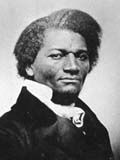Frederick Douglass, the most prominent African American proponent of abolitionism, has more than a few friends among Baptists of the North. It is with high hopes that many northern Baptists and Christians at large hear or read Douglass’ 4th of July address, entitled “The Slaveholders’ Rebellion” and delivered in New York, here noted in part:
FELLOW CITIZENS: Eighty-six years ago the fourth of July was consecrated and distinguished among all the days of the year as the birthday, of American liberty and Independence. The fathers of the Republic recommended that this day be celebrated with joy and gladness by the whole American people, to their latest posterity. Probably not one of those fathers ever dreamed that this hallowed day could possibly be made to witness the strange and portentous Events now transpiring before our eyes, and which even now cast a cloud of more than midnight blackness over the face of the whole country. We are the observers of strange and fearful transactions.
Never was this national anniversary celebrated in circumstances more trying, more momentous, more solemn and perilous, than those by which this nation is now so strongly environed. We present to the world at this moment, the painful spectacle of a great nation, undergoing all the bitter pangs of a gigantic and bloody revolution. We are torn and rent asunder, we are desolated by large and powerful armies of our own kith and kin, converted into desperate and infuriated rebels and traitors, more savage, more fierce and brutal in their modes of warfare, than any recognized barbarians making no pretensions to civilization….
….let me say in conclusion. This slavery begotten and slavery sustained, and slavery animated war, has now cost this nation more than a hundred thousand lives, and more than five hundred millions of treasure. It has weighed down the national heart with sorrow and heaviness, such as no speech can portray. It has cast a doubt upon the possibility of liberty and self Government which it will require a century to remove. The question is, shall this stupendous and most outrageous war be finally and forever ended? or shall it be merely suspended for a time, and again revived with increased and aggravated fury in the future? Can you afford a repetition of this costly luxury? Do you wish to transmit to your children the calamities and sorrows of to-day? The way to either class of these results is open to you. By urging upon the nation the necessity and duty of putting an end to slavery, you put an end to the war, and put an end to the cause of the war, and make any repetition of it impossible. But, just take back the pet monster again into the bosom of the nation, proclaim an amnesty to the slaveholders, let them have their slaves, and command your services in helping to catch and hold them, and so sure as like causes will ever produce like effects, you will hand down to your children here, and hereafter, born and to be born all the horrors through which you are now passing. I have told you of great national opportunities in the past[;] a greater [one] than any in the past is the opportunity of the present. If now we omit the duty it imposes, steel our hearts against its teachings, or shrink in cowardice from the work of to-day, your fathers will have fought and bled in vain to establish free Institutions, and American Republicanism will become a hissing and a by-word to a mocking earth.
Freedom is at stake on this annual holiday that commemorates freedom. Whether or not the ideological revolution begun in 1776 will advance or retreat is yet uncertain.
Source: Frederick Douglass, “The Slaveholders’ Rebellion,” July 4, 1862 (link); about Frederick Douglass, including image (link)



